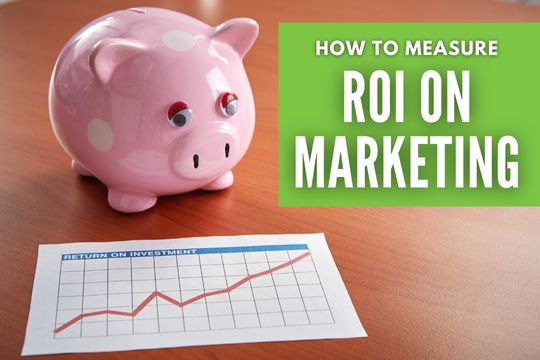
Are you unsure about how to measure ROI on marketing campaigns? Don't worry, you're not alone. Many marketers are confused about assessing whether their efforts are paying off. Luckily, there's a method for measuring the effect of marketing on revenue that can help you ensure your campaigns are working as intended and getting results. This guide will walk through all of the steps involved in calculating your ROI on marketing campaigns so that you can determine whether they're providing value for your business or not.

There are several different types of metrics you can use to measure the ROI of your marketing campaigns. For example, you could use:
A marketing dashboard. This software allows you to track multiple metrics in one place, so it's easier to look at an entire picture rather than piecing together different data sources.
An analytics tool or platform can handle your data tracking and provide useful reports. Some tools also allow for more advanced features, such as predictive modeling and machine learning, which lets users make adjustments based on their findings without manually updating anything each time new information comes in (which saves time).
A software program that acts like a search engine but only searches through the websites where companies have placed ads so they can see how effective those ads have been at generating leads or sales revenue compared to other companies' ads on similar sites (this is especially helpful if none of your competitors are using similar software).
One other route is to go with outsourced business solutions to help you set up tracking and reporting for marketing ROI. For any business, this is a no-brainer as this makes it easy to see exactly what revenue you're generating and where it's coming from.

Measurement is a process, not an event. Measuring and testing new campaigns will take time to grow your marketing ROI.
As you develop your measurement plan, keep these things in mind:
Define the problem before starting on a solution. What are you trying to accomplish? What do you want to test? The answer will guide how you measure success and failure. In particular, define two things—the campaign's goal and how that goal will be achieved (i.e., what metrics are important).
For example: “We want more people to buy products A & B by January 1st” or “We need 50% more engagement from our customers between now and December 31st so we can reach 500k new users by March 1st."
Don't worry about other people's goals; focus on yours only. If someone else has a different idea of success than yours or wants results sooner than later, don't let that distract or confuse you from reaching your goals for measurement!

Be ambitious but realistic with your timelines and expectations—and then write it down somewhere! There's nothing wrong with having big dreams as long as they're achievable within reasonable timeframes; otherwise, they'll just turn into excuses not to try at all due to discouragement after failing multiple times along the way instead of seeing each setback simply as part of learning how best to work towards achieving them instead (and possibly getting closer every time).
Marketing revenue is calculated by adding up all the money you’ve made from your product sales since the start of your marketing campaign.
This will be easy to calculate if you have only one product. However, it gets a bit more tricky if you sell multiple products and want to measure ROI across campaigns and products.
Here’s a good process to get started:
To find out how much money has been spent on marketing over a certain period (say, three months), add all the costs incurred during that period (including both paid and non-paid advertising costs).
To find out how much revenue has been generated by the campaign(s) over that same period (again, say three months), subtract any production or manufacturing costs related to creating new inventory from those same ads.
For example, you spend $200 per month on Facebook Ads with an average clickthrough rate of 2%. By analyzing conversion data from previous campaigns and assuming that there are no other factors influencing conversions like coupon codes or email list size/engagement, you can estimate that for every 100 clicks through an ad, there would be approximately 20 sales.* This means after running 800 ads at $200 each ($160k total), with 2% CTR, we should expect around 16k total conversions and thus roughly 32k in sales.*

You can use online calculators to measure marketing ROI on your website. Once you have the data from your campaigns, you can plug it into an online calculator to get a quick estimate of how much revenue you're making from each campaign.
A good example of this type of calculator is Google's AdWords ROI Calculator, which is free and easy to use. This tool will help you determine how much money you spend on paid advertising compared with what comes back in return for your investment.
To use the AdWords ROI Calculator, type in how much money was spent on each campaign along with its total impressions or clicks received during that time period.
Then choose an average cost per click (CPC) value based on what others are paying in similar campaigns and set how long those ads were running before ending them.
Next, enter any discounts or refunds offered by ad networks like Google Ads, so they'll be reflected correctly according to their percentage impact on overall costs.
It's important not only for estimating ROI but also for determining future budgets or profit margins within different industries where discounts may differ significantly between businesses trying different tactics!
Marketing analytics is a powerful tool that can be used to help you improve your marketing ROI, campaigns, and strategy. Google Analytics offers valuable insights, but there are greater dashboards that can measure more KPIs and help you calculate ROI.
Some of the KPIs you want to track and measure include:
You’re already investing money into your company’s advertising efforts, but tracking the return on this investment is important. You need to know which channels work best for you and what types of ads will generate the most sales. Marketing analytics data is essential for any business seeking success with digital marketing campaigns.

Once you have a marketing ROI metric, you’ll need to be able to track your data to measure it. There are two ways of doing this: using a marketing analytics tool or a marketing dashboard—most of these require a pixel or tagging so that it can be tracked across your website.
If you’re leaning toward the analytics tool route, there are many different options on the market right now. They all do similar things—track and analyze website traffic data—but their features vary greatly depending on what kind of information you want them to provide and how much time and effort they require from marketers.
The key is finding something that gives highly detailed information without being overwhelming; if it takes too long for someone within your company who doesn't specialize in digital marketing (or even just doesn't have tons of experience), then it's not going to work well for measuring ROI!
We hope that these tips help you to get a better understanding of how to measure marketing ROI in your business. You can use this information to make smarter decisions about your marketing campaigns and give yourself an advantage over competitors who are not tracking their data.
If you need a marketing associate that manages online marketing, let us set up the perfect marketing dashboard and reporting system for your business.
Marketing ROI measures how much revenue your marketing generates compared with what you spend. It shows whether campaigns create profit and guides future investment decisions.
Track total campaign cost, revenue earned, customer acquisition cost, customer lifetime value, conversion rates, traffic-to-lead and lead-to-customer ratios, attribution data, and engagement metrics tied to your stated goals.
Calculate ROI by subtracting marketing spend from sales growth attributed to marketing, then dividing that result by the same spend and multiplying by 100 for a percentage. Use consistent timeframes.
Helpful tools include Google Analytics, dedicated marketing dashboards, ad platform calculators, customer data platforms, and attribution software. They consolidate costs and revenue, automate reporting, and surface insights for optimization.
Review ROI at least monthly or after each campaign ends. Frequent analysis lets you tweak budgets, creatives, channels, and targeting quickly, preventing waste and improving performance over time.